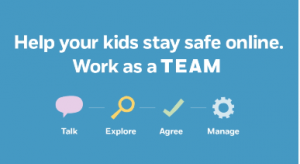E-Safety and Bullying
The internet and technology has revolutionised how we communicate and socialise with people 24 hours a day, 7 days a week. With access at our fingertips, it can be even more challenging to keep children and young people safe online, especially when they have their own computers, laptops, smartphones/mobile phones, tablets and games consoles.
As a parent, carer, it is important to educate yourself that as well as the endless opportunities available through the internet and technology, there are also associated risks to be aware of.
Potential online risks can include:
- access and exposure to inappropriate /disturbing images and content
- access and exposure to racist or hate material
- sexual grooming, luring, abuse and exploitation by/with strangers
- sharing personal information with strangers that could identify and locate a child offline
- online bullying (cyber bullying) by peer and people they consider their ‘friends’
- being encouraged take part in violent behaviour such as ‘happy slapping’
- sending or receiving sexually explicit films, images or messages of themselves or others (this is known as sexting when sent by mobile phone)
- glorifying activities such as drug taking or excessive drinking
- physical harm to young people in making video content, such as enacting and imitating stunts and risk taking activities
- leaving and running away from home as a result of contacts made online.
Keeping your child safe
There are several way to help keep child and young people safe online:
- educate yourself and children and young people know about the dangers online
- tell them what they should do if anything goes wrong online or upsets them i.e. tell someone about it
- explain that anything shared online or by mobile phone could end up being seen by anyone
- ensure computers and laptops are used where you can see and not out of sight in a bedroom
- use parental settings, filtering software and privacy setting to block inappropriate sites and content
Useful sites for further information and advice:
NSPCC – Advice on online safety
NSPCC – Sexting: Advice for parents
Parents Pack: What’s the Problem?: A guide for parents of children and young people who got in trouble online.
Know-IT-All: Information on benefits, risks and safety on the internet.
DirectGov: Guide for parents on internet safety.
Which?: Information and advice on child internet safety.
Theparentzone– Advice for parents on online safety.
Kidsmart: A safety programme website for schools, young people, parents, and agencies, produced by the children’s internet charity Childnet International
CEOP – Child Exploitation and Online Protection Centre:Organisation that works to stop child abuse on the internet.
UK Internet Safer Centre: Offers advice and guidance to parents on keeping children safe online.
Internet Matters: A non-for-profit organisation working with online safety experts to bring together information and advice on how to keep children safe online.
CEOP‘If you suspect it, report it’ This button will provide you with access to internet safety advice and help.
Bullying
Parents and carers want to be sure that their children are safe from harm at all times and it must be extremely worrying to find out that a child believes they are being bullied.
Here is some information which you may find useful and helpful.
Symptoms of Bullying which you may notice at home…
- Bed wetting, Bite marks, Bruises, Eating disorders, Eczema, Headaches, Insomnia.
- Pencil jab marks, Reluctance to attend school, Self harm, Scratches, Stress.
- Truancy, Tummy aches, vomiting.
What You Can Do if you suspect that your child may be being bullied:
- Talk to your child – ask them how they are – if there is anything worrying them.
- If they report an incident – write it down.
- Find out if this has happened before?
- It is very important they know that it is not their fault.
- If it happened at school – tell your child’s teacher.
- Keep a record.
- Encourage your child to tell someone straight away.
If you believe your child is being bullied at school, it is very important to keep school informed of any incidents so that they can deal with the situation effectively.
If, after speaking to your child’s teacher and allowing time for actions to be taken, you are not satisfied with the way the matter was dealt with, contact the head teacher and arrange a meeting. The head teacher should investigate the matter and action should be taken.
Parents/Carers Responsibilities
As well as making sure school are alerted to any concerns you may have, you should also be actively discouraging your child from participating in any behaviour which could be construed as bullying behaviour.
If you are concerned that your child is bullying others please click here for further advice
Responsibilities of the School
- Make time for parents.
- Have an up-to-date anti-bullying policy which parents can see.
- Keep accurate and up to date records.
- Develop strategies to promote a positive ethos
Other resources
Social Media guide for Parents and Carers


